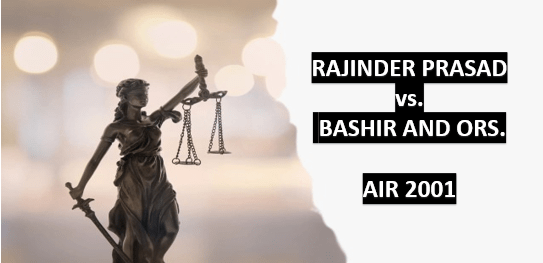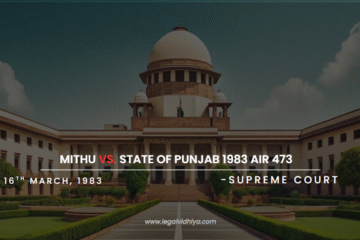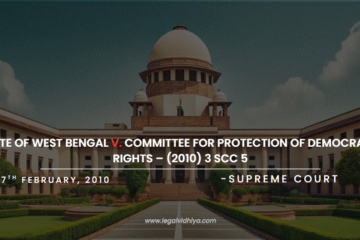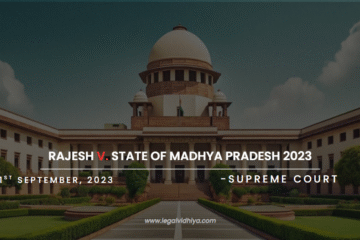
RAJINDER PRASAD vs. BASHIR AND ORS. AIR 2001
| CASE NAME: | RAJINDER PRASAD vs. BASHIR AND ORS. AIR 2001 SC 3524 |
| EQUIVALENT CITATION: | AIR 2001 SC 3524 INSC 498 |
| DATE OF JUDGEMENT: | 19th SEPTEMBER, 2001 |
| COURT: | SUPREME COURT OF INDIA |
| CASE NUMBER: | APPEAL (Crl.) 964 OF 2001 |
| CASE TYPE: | CRIMINAL APPEAL UNDER APPELLATE JURISDICTION OF SUPREME COURT |
| PETITIONER: | RAJINDER PRASAD |
| RESPONDENT: | BASHIR AND ORS. |
| BENCH: | M.B. SHAH R.P. SETHI |
SECTIONS REFERRED:
Code of Criminal Procedure, 1872 (Cr.P.C.):
CrPC Section 190: Cognizance of Offences by Magistrates
CrPC Section 319: Power to proceed against other persons appearing to be guilty of offence
CrPC Section 436: In what cases bail to be taken
CrPC Section 482: Saving of inherent power of High Court
Indian Penal Code, 1860 (IPC):
Section 395: Punishment for Dacoity
INTRODUCTION:
The appeal was made by respondents who were aggrieved by the order of the Additional Sessions Judge,Deeg which framed charges against them for the offences punishable under Sections 147, 148, 323, 324, 149, 427 and 395 of the Indian Penal Code. The respondents filed a petition under Section 482 of Code of Criminal Procedure appealing the court to quash the aforesaid order. The petitioner (ie. The Respondents) held that the Magistrate had no power to add four respondents as accused persons without adopting procedure as prescribed under Section 203 of the Code as it was a Court of Committal. The High Court allowed the petition of the Respondents and set aside the order of the court by which cognizance of offence under Section 395 of the IPC was taken. The case was then remanded back (sent back) to the learned Magistrate to hold inquiry as per provision of Section 203(2) of the CrPC and the Magistrate was directed to pass necessary orders against the accused persons and commit the case to Sessions Judge if the Magistrate finds that there was a case which was made out under Section 395 of IPC.
FACTS OF THE CASE:
The facts that gave rise to the appeal were-
On 10th March, 1998 when the appellant was sitting at his shop with his brothers, the accused persons, namely, Chhaju Khan, Bannu Khan, Nasru Khan, Zakir Khan, Mumrej Khan, Razak Khan, Kallu, Nannu, Ramesh Mishtri, and four others reached the shop and assaulted one of the brothers of the appellant (Hotilal) with an intention to kill him. The other brothers of the appellant were also assaulted as a result of which they also received injuries. The accused persons also took away a sum of INR 600 and some important documents of the shop of the appellant. The shop was also damaged resulting in loss to the property. A case was registered against the accused persons under various sections and after the completion of investigations charge-sheets were submitted against them. Since the charge sheet didn’t include Section 395 of IPC, the appellant made a petition seeking the addition of offence of Dacoity under S. 395 of IPC against the accused. The appellant also sought addition of four accused persons ( Babu, Bashir, Sultan and Rajjal) as their names were wrongly dropped from the list of accused persons by the investigating agency. This application of appellant was accepted by the Committal Magistrate and the case was committed to the Sessions Court whereafter the Learned Additional Sessions Judge being the trial court framed the charges against the respondents including charges under Section 395 of IPC.

ISSUES RAISED:
- What is the validity of the trial taken under cognizance under S. 190 of CrPC?
- What is the scope of Magistrate’s power to cognizance allotted under Section 190 of Code of Criminal Procedure?
CONTENTION OF THE PETITIONER:
The learned counsel appearing for the appellant made a two fold submission to violently criticise the judgement of the High court:
- The counsel contended that the revision petition filed by the accused persons under S. 397 of Cr.P.C. have been rejected earlier by the High Court by an order which was dated on 13.07.1990 and the accused thus had no right to file the petition under Section 482 for quashing the same order.
- The counsel also criticised the High Court for committing a mistake of law by directing the Magistrate to follow the procedure as prescribed under Section 203 of CrPC.
CONTENTION OF THE RESPONDENT:
The respondent submitted before the High Court that the Magistrate had committed a grave error by taking cognizance for offence under Section 395 IPC as also by adding the names of aforesaid four accused persons while committing them to the court of sessions to stand their trial.
JUDGEMENT:
The Honourable Supreme Court Observed:
- The order of the High Court which was released on 13.07.1990 shows that there were 13 accused. The accused had filed a revision petition which challenged the order of the Magistrate taking cognizance for the offence under Section 395 of IPC. The order prosecuted respondents 10 to 13 as accused.
- After this commitment stated above, both the Magistrate and the Sessions Judge had issued non-bailable warrants against the accused persons. The High Court then had asked the accused to appear before the Trial Court and furnish their bail bonds, however, the learned counsel for the accused did not submit the petition as far as the consideration of cognizance against them was concerned, thus not taking the case forward.
- The High Court’s order which was released dated 13.07.1990 stated as follows:
- A petition was submitted before the High Court against the order of the Magistrate, Deeg for cognizance taken for offence under Section 395 of IPC and for other offences against the petitioners 10 to 13. The petitioners 1 to 9 were granted bail initially under the Section 436 of CrPC.After the addition of a non-bailable offence under Section 395 of IPC, the Magistrate and the Sessions Judge both have directed to issue non-bailable warrants. But this was not proper since the petitioners 1 to 9 have been granted bails and the petitioners 10 to 13 would also appear before the court and provide their bail.
- The court considering the first part of the plea stated that, as far as the plea about taking cognizance is concerned the learned counsel does not submit the same.
- The honourable Supreme Court opined that when the earlier revision petition filed under Section 397 of CrPC was dismissed as not being pressed upon, the accused (Respondents Bashir and Ors.) are not be allowed to invoke the inherent powers of the High Court under Section 482 of CrPC for the grant of relief.
- The court also disagreed with the arguments of the learned counsel for respondents and stated that since the earlier petition was dismissed as it was not pressed this does not give the accused a right to challenged the order that added the offence under S. 395 of the Code and set the four persons accused for trial by way of subsequent petition under S. 482 of CrPC.
- The court defining the objective of criminal trial stated that the object is to render public justice and to assure punishments to the criminals. Delaying tactics or prolonging the commencement and conclusion of the trial often leads to suffering of public justice.
- The SC also stated that the High Court while exercising the powers under S. 482 of CrPC relied upon a judgement of the SC in the case of Krishnan & Anr. vs. Krishnaveni & Ors. AIR 1997 (4) SCC 241. But the examination of the judgement shows that the learned judge was misplaced in his reliance. The SC in its own judgement in the case had held that though the power of HC under S.482 of code is very wide, yet the same must be exercised sparingly and cautiously in a case where the petitioner is shown to have already invoked the revision all jurisdiction under S. 397 of CrPC.
- The court also, further in pursuance of High Court’s power under S. 482, stated that only in the cases where the High Court finds that because there has been a failure of justice or misuse of judicial mechanism the sentence or order was not correct. The HC may in its discretion prevent the abuse of the process or miscarriage of justice by the exercise of the power. The HC further held that in ordinary circumstances, when the revision has been barred by S. 397(3) of the Code; the accused cannot be allowed to take recourse to the revision to HC under S. 397(1) or under inherent powers under S. 482.
- The judges of SC opined that there were no special circumstances spelt out in invoking the jurisdiction under S. 482 and the impugned order was already liable to be set aside on this ground alone.
- The SC also described the mistake of the HC, that even on the ground of merits the HC committed a Mistake of Law by referring to the provisions of S. 203 of the Code and directing the Judicial Magistrate to hold enquiry as per S. 203(2) before deciding the inclusion of offence under S. 395 of IPC.
- The court also stated that in this case no complaint was filed before the Magistrate by the complainant requiring him to follow the procedure under Chapter XV. (Chapter XV of CrPC comprises Sections 200 to 203 deals with the complaints to Magistrate and procedure prescribed for dealing with such complaints.) Reference to sub section 2 of S. 203 is misconceived in as much as no such subsection exists.
- The SC observed that the Magistrate while passing the order ,which was challenged before the HC, took recourse to Chapter XIV (Sections 190 to 199) of the CrPC.
- Under S. 190 the Magistrate has jurisdiction to take cognizance of offences against such persons also, who have not been arrested by the police as accused persons, if it appeared from evidence collected by the police that the accused were at first look (prima facie) guilty of offences alleged to have been committed.
- Section 209 prescribes that when a case is constituted on police report or otherwise, the accused appears or is brought before the Magistrate and if the Magistrate finds that the offence is triable by the Sessions Court then he shall commit the case (as per S.207 and S.209) to the court of Sessions and subject to the provisions of the code pass appropriate orders.
- Thus Section 209 refers back to S. 190 as its evident from the words “ instituted on a police report ” which are used in the Section 190(1)(b).
- The SC stating its another case its dealt with for Section 190 of CrPC referred to the judgement of Raghubans Dubey vs. State of Bihar AIR 1967 (2) SCR 423. The court held that the cognizance taken by Magistrate was of the offence and not of the offenders. If a Magistrate takes cognizance then he can find out who the real offenders were and if he finds that some other persons, other than who were mentioned in by the police, were involved its the duty of the Magistrate to proceed against those persons as well.
- The SC approved its own judgement of the aforesaid case in the case of M/s. SWIL Ltd. vs. State of Delhi & Anr. AIR 2001 (6) SC 405 and held that there was no question of referring to provisions of S. 319 of CrPC. In this case of M/s. SWILL Ltd. neither the Magistrate held enquiry as contemplated under S. 2(g) nor the trial had started. Magistrate was exercising his jurisdiction under S. 190 of taking cognizance of an offence and issuing process. There is no bar under S. 190 CrPC that once the process is issued against some accused on the next date, magistrate cannot issue process to some other person against whom there is some material on record but the name of that accused is not on the chargesheet.
- The Court under the circumstances allowed the appeal by setting aside the order impugned and by upholding the order of Additional Sessions Judge.
WRITTEN BY SHRIKRISHNA GOYAL, IMS LAW COLLEGE, NOIDA




0 Comments